6 years after Parkland shooting, school librarian works hard to make her space the safest
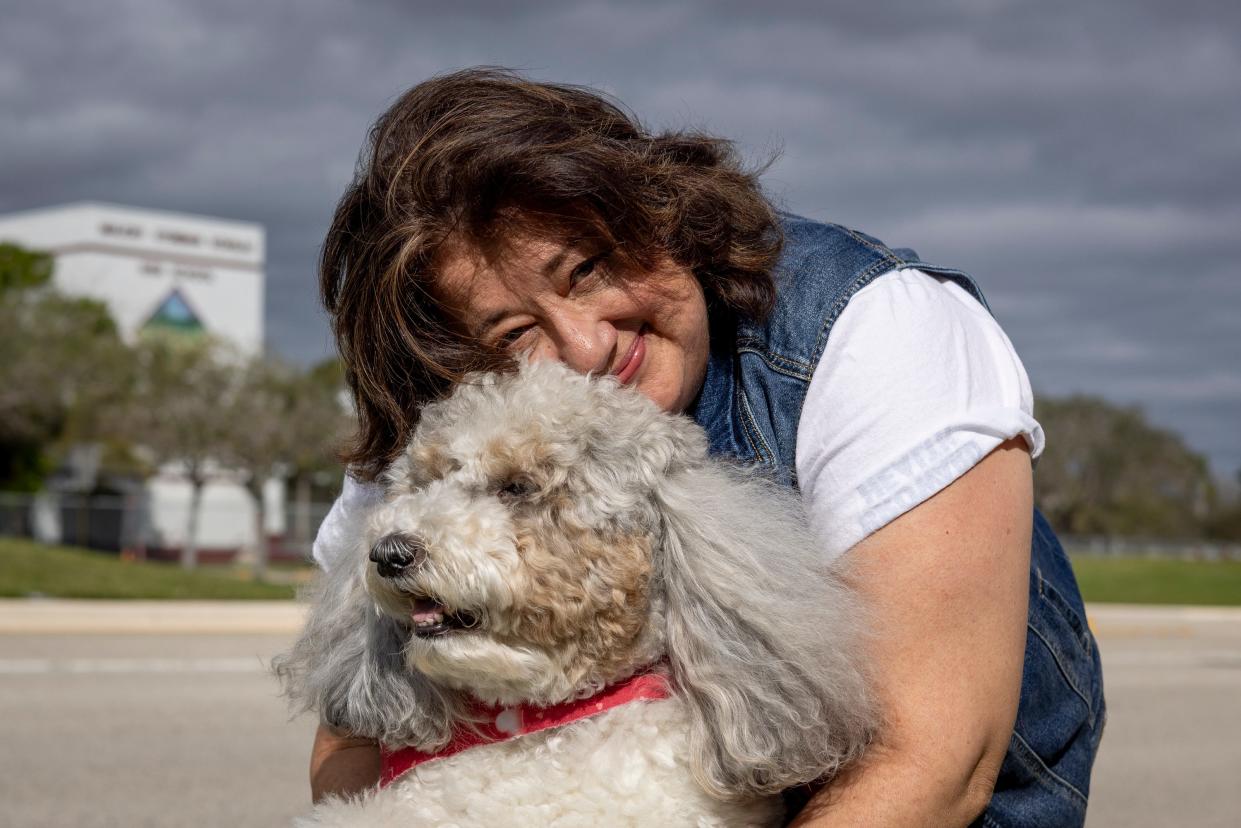
Six years since the day everything changed, the library at Marjory Stoneman Douglas High School brims with resources to promote mental health. There’s a “Zen den” for resting and decompressing, a therapy dog named River, yoga equipment, a button-making station and smartboards that display videos of crochet lessons.
Librarian Diana Haneski, River’s owner, puts a lot of thought into what to include in – and exclude from – the library’s collections. She opted to remove a Civil War-themed book with a rifle on its cover, for example, and to avoid other materials with imagery that could be upsetting. And she has made sure to include a range of literature that offers students an escape from daily life, including sci-fi novels and youth-oriented magazines.
Haneski, 63, a winner of this year's national “I Love My Librarian” award for her public service, sees such escapism and mental support as essential for herself and her students.
“People need a place to chill and relax and reduce their anxiety,” she said. It’s a conscious act on her part to help make that happen. “This is how we’re feeling better.”
The high schoolers who survived the shooting at the Parkland, Florida, campus six years ago, on Valentine’s Day 2018, have graduated. But Haneski and about half the people on staff during the massacre remain, along with the children who were in middle and elementary school when a former student opened fire, killing 17 and injuring 17 others.
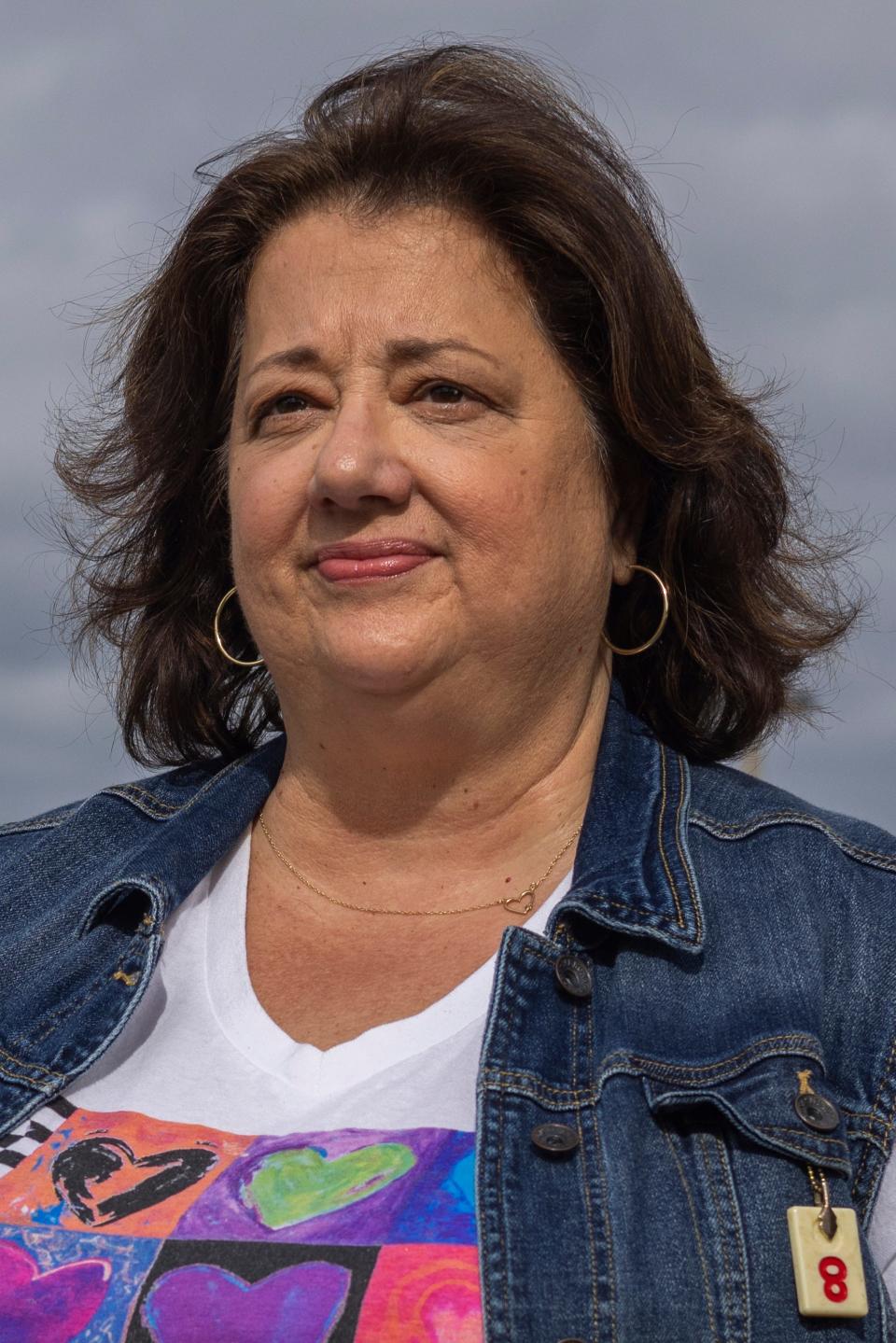
The building where the killing happened is scheduled for demolition this summer. A nearby structure that houses the library, a softly lit second-floor room with views of trees, will remain intact. The library has undergone updates since becoming a sanctuary for the campus as it heals, reflects and fortifies itself for the future.
Haneski – who was barricaded inside the library with dozens of others that awful day – and other veteran staffers still carry their trauma, relying on the library when they need help coping. Florida officials restricted what books can be on the shelves and what mental health lessons can be taught in classrooms in recent years, yet Haneski remains undeterred in her quest to keep minds and doors open. She believes a school library should be a place for joy that helps students and educators deal with the pain of those memories.
That’s a core lesson she took from the tragedy.
“Some good came from the horror,” Haneski said. “It’s OK to have some joy – to seek it, to recognize it, to be open to it.”

Different in the worst way
Haneski has been a librarian for 26 years, the past nine at Stoneman, and says it’s “the best job I’ve ever had,” in part “because it’s different every single day.”
Valentine’s Day 2018 was different in the worst way.
The campus was busy with lots of meetings and a fire drill. Students and teachers were conversing more than usual.
“And then, all of a sudden, they’re gone. Like they were there, we talked to them,” she said. “It’s unbelievable.”
Hours before the shooting, staff joked that Chris Hixon, the mustachioed athletic director and wrestling coach, had probably been a good husband on that romantic holiday. Hixon, who always helped the students during lunchtime, was just “such a nice guy,” Haneski said. The 49-year-old U.S. Navy reservist was shot as he sped toward the gunfire, trying to stop the assailant.
Haneski credits her survival that day to the advice of a friend who was the librarian at Sandy Hook Elementary on the day a former student opened fire at the school in Newtown, Connecticut.
Haneski knew to block the entrance before she hid with 54 others in a library storage room for more than two hours. She knew to wear clothes with pockets so she had her walkie-talkie, cellphone and keys handy. Inside the closet, Haneski was frozen, moving little but her eyes as she tracked the shadows creeping in through the crack beneath the door.
She later learned Joaquin Oliver was slain while in his creative writing class. She had known the senior with almond-shaped brown eyes since he was in middle school. In one of their last conversations, Haneski told the 17-year-old sports fan she’d be clapping loudly for him at graduation.
“I didn’t get to do that,” she said.
She also heard about Nikolas Cruz, the man later sentenced to life in prison for carrying out the massacre. She had last seen him in the library, printing out homework. When he was younger, she remembered, “he was out of it.” But that day, “he looked like somebody who knew what he wanted and was getting it done,” Haneski said. “It looked to me like he was going to be better.”
They survived school shootings: Now their own kids are in classrooms amid rising epidemic.
Beginning to defrost
For months after the massacre, Haneski could hardly eat or focus; she couldn’t even read. She could not fathom returning to a campus where such an evil thing had happened, where so many people she knew and cared deeply about lost their lives.
She attended some of the funerals, hearing from victims’ parents, siblings and friends. She witnessed their courage as they demanded change and attracted the attention of policymakers.
“And I said: ‘You know what? If they have that strength, I'd better go back because I need to be there. I’m not afraid. I have to go. I am still alive,’” she said. “I’m still here – I have to do something good.”
It took time for the Stoneman library to resume being a place of serenity.
In the early days, the school received an outpouring of support. There were therapy dogs – golden retrievers, Labradors, mutts and River, a puffy mini Bernedoodle with piercing eyes and a glistening black nose who came that July as a puppy.
We’ve included these cuties in the yearbook ???? pic.twitter.com/CZScvAhjCN
— Aerie Yearbook (@AerieYearbook) May 3, 2019
There were counselors who consoled and pastors who prayed and artists who painted and sang. Volunteers and home economics students at a nearby school made blankets and pillowcases, like the vibrant quilt of pinks, oranges and purples that Haneski still keeps draped over her office chair.
Haneski was grateful but overwhelmed. She managed to return to campus, but she struggled to engage, warily watching the influx of helpers who stationed themselves in the library through a window in her office.
Then came some folks from the Center for Mind-Body Medicine. The center trains communities around the world affected by trauma in self-care and self-awareness techniques. Experts teach the strategies to community members who then share the practices with others. The center believes the people who have dealt with the trauma firsthand are best equipped to teach such strategies.
James S. Gordon, a psychiatrist who founded and leads the center, recalls Haneski being skeptical when he began leading activities in the library.
Haneski wasn’t sure this was for her. But once she tried the breathing exercises, the guided imagery, the mindful eating and walking, she immediately understood their power. An especially powerful activity had participants to shake their arms and legs, “sort of like a chicken dance,” she said. After she tried that – for the first time since the shooting – Haneski’s physical body started to feel better.
She finally began to defrost.
“I could see the change,” Gordon said. “I could see she had gone from this place of being frozen and shut down to feeling herself come alive again.”
Social-emotional learning under fire
After the massacre, Florida officials implemented a host of reforms aimed at making communities safer: They raised the legal age to buy a gun and required a three-day waiting period.
The state’s Republican leadership also promoted social-emotional learning, a model that includes lessons on emotional regulation, relationship skills and responsible decision-making.
But in the years that followed, conservative leaders in Tallahassee reversed course. Gov. Ron DeSantis signed a law allowing people to carry concealed weapons without a permit, and lawmakers attempted to undo the mandatory age for buyers and the waiting period.
DeSantis has also worked to restrict social-emotional learning in schools, saying this material is a form of indoctrination. A USA TODAY investigation last year found that the governor’s rhetoric around such learning resulted in several large districts phasing out the type of lessons that the Stoneman community had embraced after the shooting.
It has been heartbreaking for Haneski and her colleagues to hear, with unbearable regularity, about students and teachers dying of gun violence in other communities. In 2020 and 2021, firearm injuries were the leading cause of death among children.
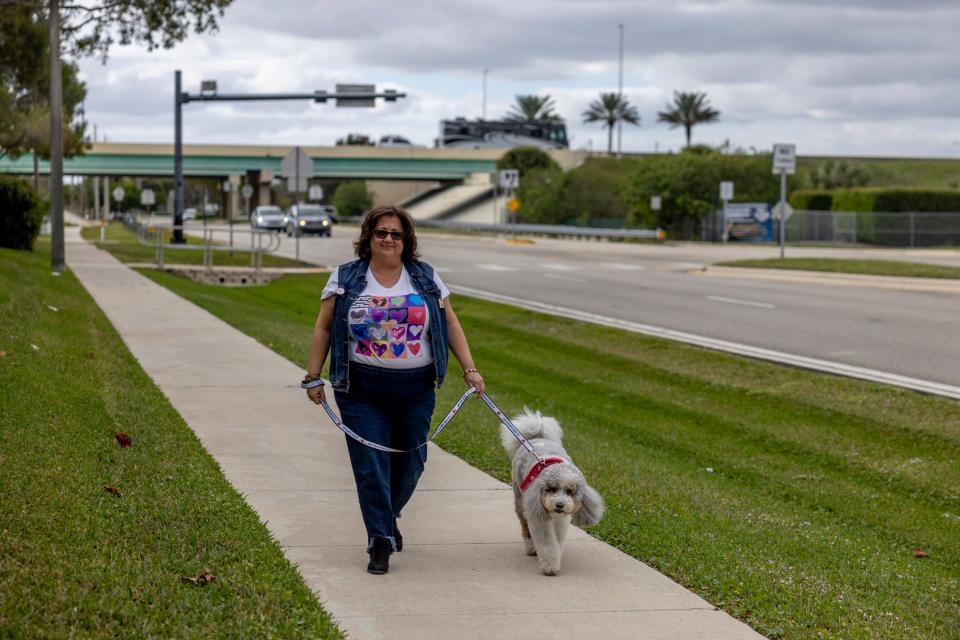
“I feel like we made some progress, but then we didn’t,” Haneski said. “How could there be so many shootings after all that? It’s incredible to me.”
Haneski has also watched as libraries, those sanctuaries of good, became targets. In Florida, some school librarians have been instructed to remove books designed to be inclusive of diverse identities.
Haneski tries not to let these controversies derail her. She focuses on what’s in front of her.
'The perfect target'?: Movement to ban books from schools brings vitriol toward librarians
Glitter and mindfulness
Haneski now serves as a facilitator with the mind-body center and credits its work, along with similar mindfulness efforts, with helping her emerge from the trauma.
That work inspired the “Zen den” – also called “the eagles’ nest,” a nod to the school’s mascot – which kids and teachers visit for a “rest in the nest,” whether they need some quiet time or a place to work through a moment of stress or sadness.
Friends say Haneski often starts meetings and conversations with a pause and a deep breath. She carries around a water bottle filled with glitter, kind of a homemade snow globe. She offers the bottle to kids who are stressed out. They shake it, and as the glitter settles, so do they.
It helps Haneski, too.
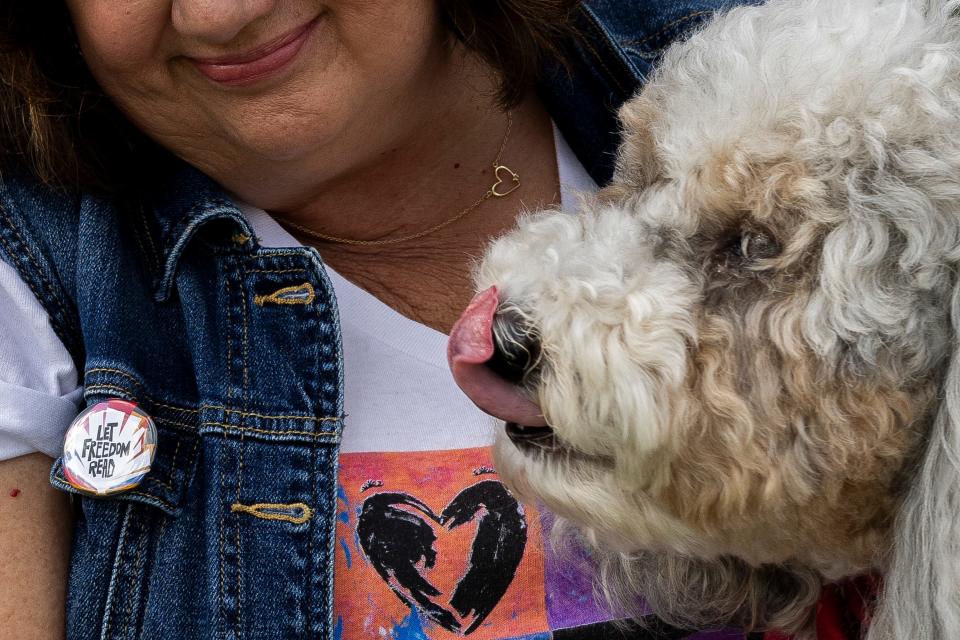
The students are building their resilience and sharing what they've learned with the broader community.
Tai chi and paper cranes
Feb. 14 is a day of service for Stoneman, with kids engaging in an activity of their choice.
The Mind Body Club will be hosting a tai chi session. Other groups will have letter writing and bracelet stringing tables. One club will be making paper cranes for cancer patients. Some students will volunteer with a project that creates blankets for children in need.
Haneski has tapped back into her bubbly, lighthearted nature since the tragedy, said Yvonne Cech, the former Sandy Hook librarian: "What makes Diana so special is that she turned everything into positive energy."
Cech wasn’t surprised Haneski ended up having to take her safety advice.
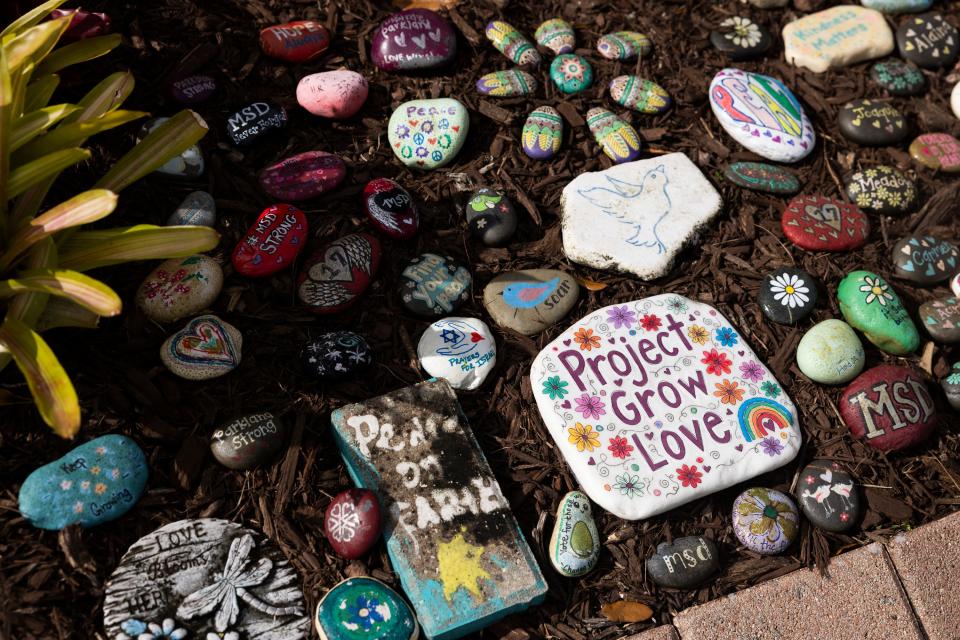
"Before this, no one could've convinced me that both of us would be in this situation, but once it happens to you, your sense of what's normal is gone," Cech said.
The coincidence has transformed both women into reluctant school safety experts and willing advocates for stronger gun control.
"I'm glad she had that to her advantage in her situation, but nobody should have to be prepared."
Contact Alia Wong at (202) 507-2256 or [email protected]. Follow her on X at @aliaemily.
This article originally appeared on USA TODAY: Parkland school librarian makes her space the safest after shooting
